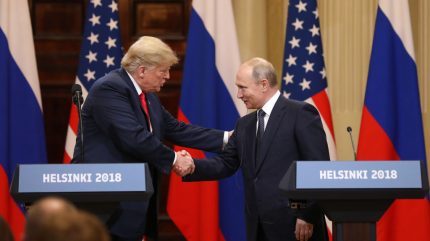
Russian officials and President Vladimir Putin are reminding foreign businesses that any return to the Russian market would have strict conditions. As the US and Russian governments grow uncharacteristically closer, some hope it will mean an end to the corporate decoupling that took place in 2022 after Russia invaded Ukraine and sparked the war.
Speaking to the Russian Union of Industrialists and Entrepreneurs on Tuesday (19 March), Putin said foreign businesses that sold their assets at low prices amid the 2022 exodus would not be able to repurchase them for those same rates. He said officials should focus on creating a regulatory framework that allows Russian companies to maintain an “advantage” while enabling the return of foreign businesses.
“Each deal will require separate, careful consideration,” Putin told the business lobby on Tuesday. He added that government should make lists of foreign companies “that stopped working in Russia and develop a procedure for their return with mandatory guarantees of conscientious and responsible conduct”.
For the past three years, the Russian economy has adapted to the vacuum left by foreign businesses, with domestic manufacturers having taken over their market share; therefore, many Russian companies do not want foreign rivals to return.
Since 2022, 472 foreign companies left the Russian market and 1,360 scaled back their investments, according to the Kyiv School of Economics Institute. Western sanctions, particularly from the US, played a major part in this exit.
However, since the arrival of US President Donald Trump earlier this year, a massive geopolitical realignment is strengthening ties between the Kremlin and the White House.
Over the past few weeks, Trump, Putin, Ukrainian President Volodymyr Zelenskyy and other major global players have been involved in talks over a potential end to the war. This has fuelled investor optimism over the return of international companies – but even if sanctions are lifted and the war ends, top-ranking Russian officials have expressed scepticism.
“We are not waiting for anyone with open arms. You will have to pay for everything, for your behaviour,” Russian Industry and Trade Minister Anton Alikhanov said to reporters on 20 February. The past three years have been “an opportunity for [domestic] development and we would not like to give it up,” he said.
Kirill Dmitriev, Russia’s Special Envoy for International Economic and Investment Cooperation, has said US companies that want to return would have to enter into joint ventures with Russian counterparts that have taken over their market share.
Only an hour after a much-discussed partial ceasefire in the Ukraine-Russia war was brokered by Trump during a phone call with Putin yesterday (19 March), 40 Russian drones flew into Ukrainian airspace and struck civilian buildings and an energy station, breaking the terms of the ceasefire.
“You see? [There is] already an air alert, so this [ceasefire] is already not working,” Zelenskyy told reporters yesterday night.



